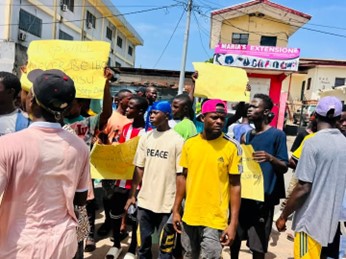The headquarters of the National Disaster Management Agency (NDMA) in Liberia became the focal point of a growing discontent within the All Liberian Coalition Party (ALCOP), a collaborating party of President Boakai’s ruling Unity Party (UP). Dozens of ALCOP supporters staged a protest demanding the immediate resignation of their party chairman, Ansu Dolley, who also serves as the Executive Director of the NDMA. The protesters accused Dolley of corruption, nepotism, and failing to leverage his position to secure government jobs for party loyalists.
The demonstration, held on Monday, June 2, 2025, saw aggrieved partisans brandishing placards with inscriptions such as “Mr. Rude Must Step Down Immediately” and chanting slogans reflecting their disillusionment with Dolley’s leadership. Musa Keita, a spokesperson for the protesters, articulated their grievances, stating that Dolley had neglected the needs of loyal supporters who expected tangible benefits from the party’s political prominence. The protesters argued that their hard work and dedication to the party warranted reciprocal support in the form of job opportunities within the government. Placards reading “We Deserve Better” and “Bring Jobs Home” underscored their demands for accountability and action from their party leadership.
The demonstration, though passionate, remained peaceful. Under the watchful eye of Liberian National Police officers, protesters maintained a respectful distance from the NDMA entrance. However, the peaceful façade masked simmering tensions. As the day wore on, the lack of response from the party leadership fueled anxieties among the protesters, who felt abandoned and unheard. Their initial hope that their voices would be heard gave way to a sense of betrayal, further solidifying their call for Dolley’s resignation.
This protest reveals a deeper rift within ALCOP. The calls for Dolley’s removal stem not only from the immediate concerns about patronage but also reflect broader anxieties about his leadership capabilities and alleged corrupt practices. Musa Keita emphasized the crucial role of effective leadership in maintaining party unity and public trust, arguing that the erosion of confidence in Dolley’s leadership posed a significant threat to the party’s stability. The protesters’ grievances highlight a critical moment for ALCOP, putting its internal cohesion and commitment to its supporters to the test.
The allegations against Dolley point to a pattern of behavior that has alienated a significant segment of the party base. The protesters believe that he has prioritized personal gain over the well-being of the party and its members. The accusations of nepotism suggest that Dolley has favored family and close associates in the distribution of government positions, further exacerbating the sense of betrayal among those who feel overlooked. This perceived self-serving leadership has fueled the growing discontent and ultimately led to the public demonstration demanding his resignation.
Dolley’s response to the protest, though delayed due to his stated medical treatment, further complicated the situation. Expressing surprise at the demonstration, he promised to address the press the following day. This delayed response, coupled with his absence from the scene, likely intensified the protesters’ frustration. The incident has exposed deep-seated issues within ALCOP, requiring a decisive and transparent response to address the underlying concerns and restore confidence in the party’s leadership. The future of ALCOP hinges on how effectively it navigates this crisis and addresses the demands of its disillusioned supporters.














